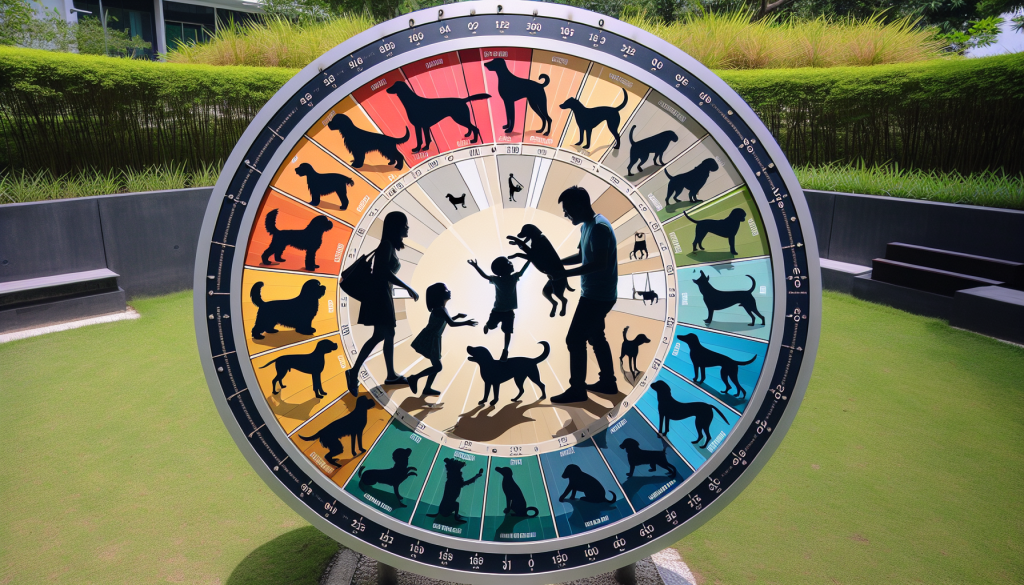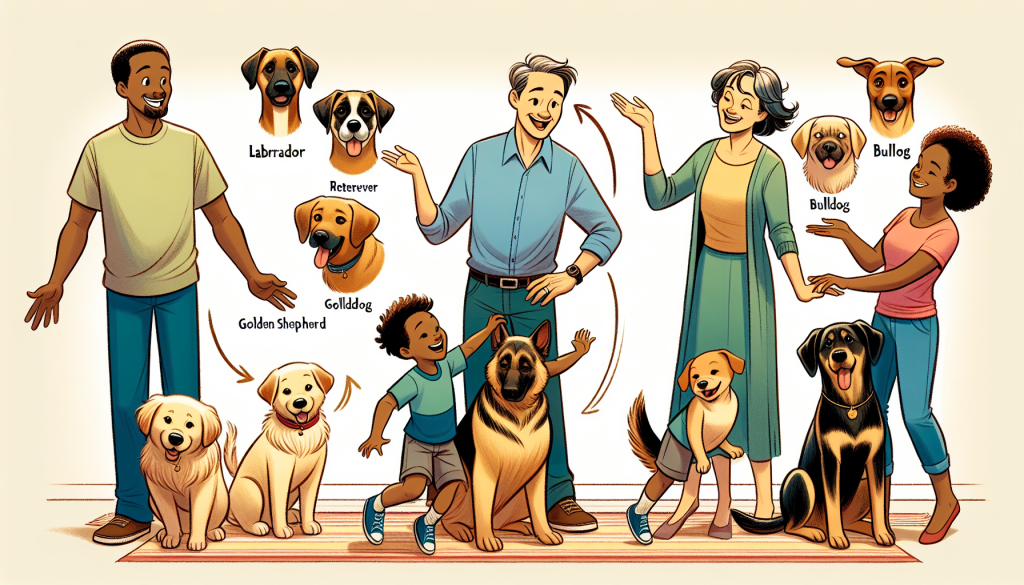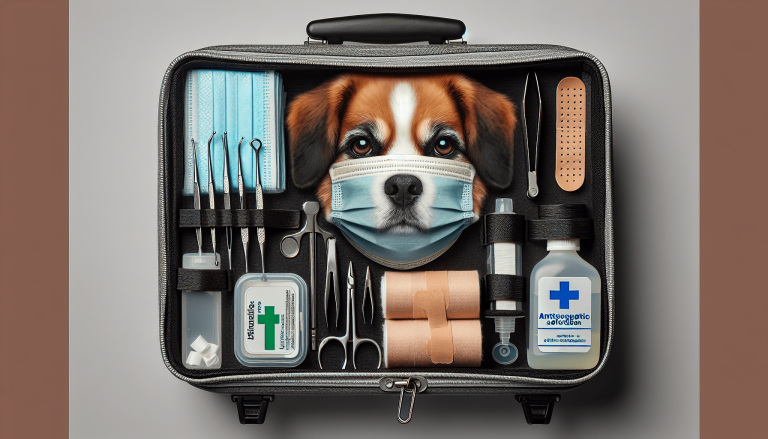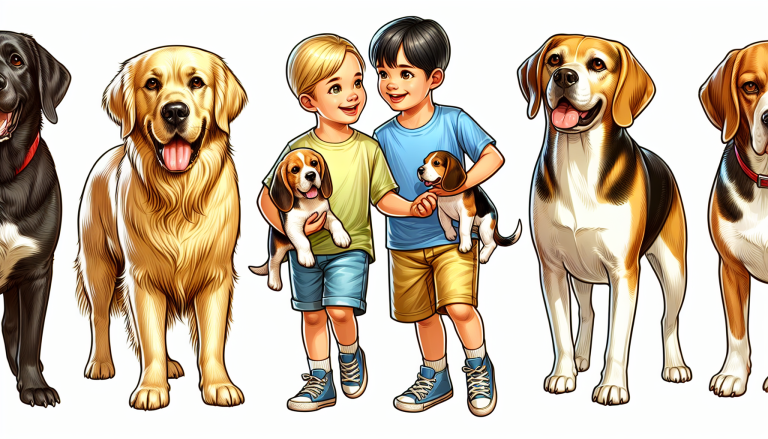If you’re considering adding a furry friend to your family but want to make sure they’ll get along well with your children, look no further! This article presents the top 10 dog breeds that are known for their compatibility with families and children. From the playful and affectionate Labrador Retriever to the loyal and gentle Golden Retriever, you’ll discover the perfect breed to bring joy, companionship, and endless fun into your home. So get ready to meet your new four-legged family member!
Table of Contents
ToggleLabrador Retriever
Temperament and Characteristics
Labrador Retrievers are known for their friendly and outgoing personalities. They are incredibly loyal and make excellent family pets. Labs are intelligent and easily trainable, which makes them a popular choice for families with children. They have a gentle nature and are generally good with kids, making them an ideal choice for families looking for a dog that can handle the energy and excitement of young children.
Suitability for Families with Children
Labrador Retrievers are highly suitable for families with children. They are patient and tolerant, making them great companions for kids of all ages. Labs are known for their gentle nature and love to be part of the family. They get along well with children and are often playful and energetic, which can be a lot of fun for kids. Labs are also known to be protective of their family, making them an excellent choice for families looking for a dog that will look out for their children.
Training and Exercise Needs
Labrador Retrievers are highly trainable dogs and enjoy learning new tricks and commands. They are intelligent and eager to please, which makes training them a relatively easy task. Labs are also a very active breed and require regular exercise to keep them happy and healthy. Daily walks and playtime are a must for this breed, as they have an abundance of energy. They also enjoy activities such as swimming and fetching, so incorporating these into their exercise routine can help keep them entertained and fulfilled.
Grooming Requirements
Labrador Retrievers have a short, dense coat that is relatively easy to maintain. They are known for their water-resistant double coat, which helps keep them warm and dry in various weather conditions. Regular brushing is recommended to remove loose hair and keep their coat looking its best. Labs are moderate shedders, so expect some hair around the house. Bathing should be done as needed, and regular checks of their ears and nails are also important for their overall grooming needs.
Health Concerns
Labrador Retrievers are generally healthy dogs, but like all breeds, they are prone to certain health conditions. Some of the common health issues seen in Labs include hip and elbow dysplasia, which are genetic conditions that affect the joints. They are also prone to obesity, so it’s important to monitor their diet and provide regular exercise to maintain a healthy weight. Labs are also at risk for certain eye conditions such as cataracts and progressive retinal atrophy. Regular vet check-ups and a balanced lifestyle can help detect and prevent these health concerns.
Availability and Cost
Labrador Retrievers are a popular breed, so finding a reputable breeder shouldn’t be too difficult. However, it’s important to do thorough research and choose a breeder who prioritizes the health and well-being of their dogs. Adopting a Labrador Retriever from a rescue or shelter is also a great option, as there are often Labs in need of a loving home. The cost of a Labrador Retriever can vary depending on factors such as the breeder, location, and lineage. On average, you can expect to pay between $800 to $1,500 for a Labrador Retriever puppy.
Golden Retriever
Temperament and Characteristics
Golden Retrievers are known for their friendly and gentle nature. They are highly intelligent and have a natural desire to please their owners. Goldens are affectionate dogs that thrive on human companionship, making them an excellent choice for families with children. They are patient and tolerant, which makes them great playmates for kids of all ages.
Suitability for Families with Children
Golden Retrievers are highly suitable for families with children. They are known for their patient and tolerant nature, making them ideal companions for kids. Goldens are known to be gentle and loving, and they often form strong bonds with their human family members. They are also known to be good with other pets, making them a great addition to multi-pet households. Golden Retrievers are often seen as “nanny dogs” due to their natural instincts to protect and care for children.
Training and Exercise Needs
Golden Retrievers are highly trainable dogs and excel in obedience training. They are intelligent and eager to please their owners, which makes training them a rewarding experience. Goldens also have a lot of energy and require daily exercise to keep them physically and mentally stimulated. Regular walks, playtime, and opportunities to swim are all great ways to provide exercise for this active breed. They also enjoy activities such as fetch and agility training, which can help keep them engaged and entertained.
Grooming Requirements
Golden Retrievers have a dense double coat that requires regular grooming to keep it looking its best. They are moderate shedders and require regular brushing to remove loose hair and prevent matting. Golden Retrievers also require frequent bathing to keep their coat clean and free of dirt and debris. Regular checks of their ears, nails, and teeth are also important for their overall grooming needs. It’s important to note that their long fur may require more attention during shedding seasons.
Health Concerns
Golden Retrievers are generally healthy dogs, but like all breeds, they are prone to certain health conditions. Hip and elbow dysplasia, as well as certain types of cancer, are common health concerns in the breed. Golden Retrievers are also prone to obesity, so maintaining a balanced diet and providing regular exercise is crucial. They may also be at risk for certain eye conditions such as cataracts and progressive retinal atrophy. Regular vet check-ups and a healthy lifestyle can help detect and manage these health concerns.
Availability and Cost
Golden Retrievers are a popular breed, so finding a reputable breeder shouldn’t be too difficult. However, it’s important to do thorough research and choose a breeder who prioritizes the health and well-being of their dogs. Adoption is also a great option, as there are often Golden Retrievers in need of loving homes. The cost of a Golden Retriever can vary depending on factors such as the breeder, location, and lineage. On average, you can expect to pay between $1,000 to $3,000 for a Golden Retriever puppy.
Bulldog
Temperament and Characteristics
Bulldogs have a distinctive appearance and a lovable personality. They are known for their friendly and docile nature, making them great companions for families with children. Bulldogs are known to be patient and affectionate, and they form strong bonds with their human family members. They may have a calm and laid-back demeanor, but they are also known to have a sense of humor and can be quite entertaining.
Suitability for Families with Children
Bulldogs are highly suitable for families with children. They are generally good-natured and get along well with kids. Bulldogs are known to be patient and tolerant, which makes them ideal for families with young children. They are protective of their family and are often seen as gentle giants. Bulldogs are also quite adaptable and can be comfortable in various living situations, whether it’s an apartment or a house with a yard.
Training and Exercise Needs
Bulldogs are not known for their athleticism or high exercise needs. They are a low-energy breed and are relatively inactive compared to other breeds. Bulldogs enjoy a leisurely stroll or playtime, but they are generally not up for intense physical activities. It’s important to provide mental stimulation through training and interactive toys to keep their minds sharp. They may also benefit from regular short walks to maintain a healthy weight.
Grooming Requirements
Bulldogs have a short, fine coat that is relatively easy to care for. They are moderate shedders and require regular brushing to remove loose hair and keep their coat looking neat. Bulldogs have a tendency to drool and snore, so regular cleaning of their facial folds and regular dental care are important to prevent any discomfort or health issues. Their nails should also be trimmed regularly to prevent overgrowth.
Health Concerns
Bulldogs are unfortunately prone to certain health issues due to their unique anatomy. They have a brachycephalic (flat-faced) structure, which can lead to respiratory problems and overheating in extreme temperatures. Bulldogs are also prone to skin allergies, hip and elbow dysplasia, and eye conditions such as cherry eye and entropion. Regular vet check-ups and proper care can help manage and prevent potential health concerns.
Availability and Cost
Bulldogs are a popular breed, so finding a reputable breeder shouldn’t be too difficult. However, it’s important to be cautious and choose a breeder who prioritizes the health and well-being of their dogs. Adoption is also a great option, as there are often Bulldogs in need of loving homes. The cost of a Bulldog can vary depending on factors such as the breeder, location, and lineage. On average, you can expect to pay between $1,500 to $4,000 for a Bulldog puppy.
Beagle
Temperament and Characteristics
Beagles are known for their friendly and outgoing personalities. They are sociable dogs that love to be around people. Beagles are curious and have a strong sense of smell, which can sometimes get them into trouble. They are also known for their distinctive baying or howling sounds, which can be endearing or challenging depending on personal preference.
Suitability for Families with Children
Beagles are highly suitable for families with children. They are generally good-natured and enjoy the company of kids. Beagles are known to be patient and tolerant, making them great playmates for children. They have an affectionate nature and often form strong bonds with their family members. Beagles are also sociable with other dogs and can be a good addition to a multi-pet household.
Training and Exercise Needs
Beagles are intelligent but can be independent, which means training may require patience and consistency. They have a keen sense of smell, which can lead to a strong prey drive and distractibility during training. Beagles require regular mental and physical exercise to keep them mentally stimulated and prevent boredom. Daily walks, playtime, and puzzle toys can help meet their exercise needs and keep their minds sharp.
Grooming Requirements
Beagles have a short, low-maintenance coat that is relatively easy to care for. They are moderate shedders and require regular brushing to remove loose hair and keep their coat looking tidy. Beagles are also prone to ear infections, so regular cleaning and checks of their ears are important. Their nails should be trimmed regularly to prevent overgrowth, and dental care should be provided to maintain good oral hygiene.
Health Concerns
Beagles are generally healthy dogs, but like all breeds, they are prone to certain health conditions. Beagles can be prone to obesity if not provided with a balanced diet and regular exercise, so monitoring their weight is important. They are also at risk for certain eye conditions such as glaucoma and cherry eye. Regular vet check-ups and preventative care can help ensure their overall health and well-being.
Availability and Cost
Beagles are a popular breed, so finding a reputable breeder or rescue organization shouldn’t be too difficult. It’s important to do thorough research and choose a breeder or organization that prioritizes the health and well-being of their dogs. The cost of a Beagle can vary depending on factors such as the breeder, location, and lineage. On average, you can expect to pay between $500 to $1,500 for a Beagle puppy.
Boxer
Temperament and Characteristics
Boxers are known for their playful and energetic personalities. They are a highly social breed and love to be around their family. Boxers are known for their loyalty and affectionate nature, making them excellent companions for families with children. They are also known for their clown-like antics and ability to bring joy and laughter to any household.
Suitability for Families with Children
Boxers are highly suitable for families with children. They are known to be patient and protective of their family members, especially children. Boxers often form strong bonds with their human family and are known for their gentle and patient nature. They are also energetic and playful, which makes them great playmates for kids. Boxers are incredibly adaptable and can be comfortable in various living situations.
Training and Exercise Needs
Boxers are highly trainable dogs and are known to be eager to please their owners. They are intelligent and require mental stimulation to keep them engaged and prevent boredom. Boxers have a lot of energy and require regular exercise to keep them physically and mentally stimulated. Daily walks, playtime, and opportunities for interactive games can help meet their exercise needs. Boxers also excel in activities such as agility and obedience training.
Grooming Requirements
Boxers have a short, smooth coat that is relatively easy to care for. They are low-maintenance in terms of grooming and only require regular brushing to remove loose hair and keep their coat looking neat. Boxers are moderate shedders, so expect some hair around the house. Regular checks of their ears, nails, and teeth are important for their overall grooming needs. They are also prone to drooling, so regular cleaning of their facial folds may be necessary.
Health Concerns
Boxers are generally healthy dogs, but like all breeds, they are prone to certain health conditions. Boxers may be prone to certain genetic conditions such as hip and elbow dysplasia. They are also at risk for certain heart conditions such as cardiomyopathy. Boxers also have a higher risk of developing certain types of cancer. Regular vet check-ups and a healthy lifestyle can help detect and manage potential health concerns.
Availability and Cost
Boxers are a popular breed, so finding a reputable breeder or rescue organization shouldn’t be too difficult. It’s important to do thorough research and choose a breeder or organization that prioritizes the health and well-being of their dogs. The cost of a Boxer can vary depending on factors such as the breeder, location, and lineage. On average, you can expect to pay between $1,000 to $2,500 for a Boxer puppy.
Collie
Temperament and Characteristics
Collies are known for their intelligence and loyalty. They are a highly trainable breed and thrive on mental stimulation. Collies are known to be gentle and patient, making them a great choice for families with children. They are also protective of their family and may exhibit herding instincts, especially with children.
Suitability for Families with Children
Collies are highly suitable for families with children. They are known to be gentle and patient, and they often form strong bonds with their human family members. Collies are known to be great with kids and may try to herd them, especially when they are running or playing. They are also known to be protective of their family, making them an excellent choice for families looking for a loyal and loving companion.
Training and Exercise Needs
Collies are highly trainable dogs and excel in obedience training. They are intelligent and eager to please their owners, which makes training them a rewarding experience. Collies require mental stimulation to keep them engaged and prevent boredom. Regular playtime, interactive toys, and puzzle games can help keep their minds sharp. They also require regular exercise to keep them physically fit and fulfilled.
Grooming Requirements
Collies have a beautiful, long, and dense double coat that requires regular grooming to keep it looking its best. They are moderate shedders and require regular brushing to remove loose hair and prevent matting. Collies have a “mane” around their neck and a full tail, which adds to their elegant appearance. They may require more frequent grooming during shedding seasons to manage their thick coat.
Health Concerns
Collies are generally healthy dogs, but like all breeds, they are prone to certain health conditions. Collies can be at risk for certain genetic conditions such as hip and elbow dysplasia. They may also be prone to certain eye conditions such as collie eye anomaly and progressive retinal atrophy. Regular vet check-ups and preventative care are important for maintaining their overall health and detecting any potential health concerns.
Availability and Cost
Collies are not as commonly found as some of the other breeds mentioned, but finding a reputable breeder or rescue organization is still possible. It’s important to do thorough research and choose a breeder or organization that prioritizes the health and well-being of their dogs. The cost of a Collie can vary depending on factors such as the breeder, location, and lineage. On average, you can expect to pay between $800 to $2,000 for a Collie puppy.
Poodle
Temperament and Characteristics
Poodles are known for their intelligence and elegance. They are highly trainable dogs and excel in various dog sports and activities. Poodles have a friendly and outgoing personality, which makes them a great choice for families with children. They are also known to be hypoallergenic, making them a popular choice for families with allergies.
Suitability for Families with Children
Poodles are highly suitable for families with children. They are known to be friendly and gentle, making them ideal companions for kids. Poodles thrive on human companionship and enjoy being part of the family. They are also playful and enjoy interactive games and activities with their family members. Poodles can adapt well to various living situations, whether it’s a house with a yard or an apartment.
Training and Exercise Needs
Poodles are highly trainable dogs and enjoy learning new tricks and commands. They are intelligent, eager to please, and excel in various dog sports such as agility and obedience. Poodles require mental stimulation to prevent boredom, and regular exercise is important to keep them physically fit. Daily walks, playtime, and interactive toys can help meet their exercise needs.
Grooming Requirements
Poodles have a unique coat that is dense, curly, and hypoallergenic. They require regular grooming to keep their coat healthy and free of tangles. Poodles do not shed like other breeds, but their thick coat requires regular brushing to prevent matting. They also require regular professional grooming to maintain their signature haircut. Regular checks of their ears, nails, and teeth are important for their overall grooming needs.
Health Concerns
Poodles are generally healthy dogs, but like all breeds, they are prone to certain health conditions. Poodles may be prone to certain genetic conditions such as hip dysplasia and progressive retinal atrophy. They are also at risk for certain skin conditions such as allergies and skin infections. Regular vet check-ups and preventative care can help ensure their overall health and well-being.
Availability and Cost
Poodles are a popular breed, so finding a reputable breeder or rescue organization shouldn’t be too difficult. It’s important to do thorough research and choose a breeder or organization that prioritizes the health and well-being of their dogs. The cost of a Poodle can vary depending on factors such as the breeder, location, and lineage. On average, you can expect to pay between $1,000 to $3,000 for a Poodle puppy.
Cavalier King Charles Spaniel
Temperament and Characteristics
Cavalier King Charles Spaniels are known for their friendly and affectionate nature. They are a small breed that loves human companionship and thrives on being part of the family. Cavaliers have a gentle and friendly disposition, making them a great choice for families with children. They are often described as “love sponges” because of their desire to be around their human family members.
Suitability for Families with Children
Cavalier King Charles Spaniels are highly suitable for families with children. They are known to be gentle and patient, making them great playmates for kids. Cavaliers have a loving and affectionate nature, and they often form strong bonds with their human family members. They are also good with other pets, which makes them a great addition to multi-pet households.
Training and Exercise Needs
Cavalier King Charles Spaniels are intelligent and generally eager to please their owners. However, they can sometimes have a stubborn streak, so training may require patience and positive reinforcement techniques. Cavaliers are a small breed and do not have high exercise needs. Regular walks, playtime, and interactive games can help provide mental and physical stimulation for this breed.
Grooming Requirements
Cavalier King Charles Spaniels have a medium-length silky coat that requires regular grooming to keep it looking its best. They are moderate shedders and require regular brushing to remove loose hair and prevent matting. Cavaliers also require regular ear cleaning to prevent ear infections, as their long and floppy ears can trap moisture. Their nails should be trimmed regularly, and dental care should be provided to maintain good oral hygiene.
Health Concerns
Cavalier King Charles Spaniels are generally healthy dogs, but like all breeds, they are prone to certain health conditions. They can be prone to certain genetic conditions such as heart disease and syringomyelia. Cavaliers are also at risk for developing certain eye conditions such as progressive retinal atrophy and cataracts. Regular vet check-ups and preventative care can help manage and prevent potential health concerns.
Availability and Cost
Cavalier King Charles Spaniels are a popular breed, so finding a reputable breeder or rescue organization shouldn’t be too difficult. It’s important to do thorough research and choose a breeder or organization that prioritizes the health and well-being of their dogs. The cost of a Cavalier King Charles Spaniel can vary depending on factors such as the breeder, location, and lineage. On average, you can expect to pay between $1,500 to $3,500 for a Cavalier King Charles Spaniel puppy.
Bichon Frise
Temperament and Characteristics
Bichon Frises are known for their friendly and cheerful personalities. They are a small breed that loves human companionship and thrives on being part of the family. Bichons are happy and playful dogs that are often described as clowns. They have a gentle nature and get along well with people of all ages, making them a great choice for families with children.
Suitability for Families with Children
Bichon Frises are highly suitable for families with children. They are known to be patient and playful, making them great playmates for kids. Bichons are affectionate and often form strong bonds with their human family members. They are also sociable with other pets, which makes them a great addition to multi-pet households.
Training and Exercise Needs
Bichon Frises are intelligent dogs that are generally eager to please their owners. They respond well to positive reinforcement training methods and enjoy learning new tricks and commands. Bichons have moderate exercise needs and enjoy regular walks and playtime. They also thrive on mental stimulation and enjoy interactive toys and puzzle games.
Grooming Requirements
Bichon Frises have a curly and dense coat that requires regular grooming to keep it looking its best. They are low-shedding dogs and often considered hypoallergenic, which can be a plus for families with allergies. Bichons require regular brushing to prevent matting and may benefit from professional grooming every few months. Regular checks of their ears, nails, and teeth are important for their overall grooming needs.
Health Concerns
Bichon Frises are generally healthy dogs, but like all breeds, they are prone to certain health conditions. Bichons can be prone to certain genetic conditions such as hip dysplasia and luxating patellas. They may also be at risk for certain eye conditions such as cataracts and progressive retinal atrophy. Regular vet check-ups and a healthy lifestyle can help detect and manage potential health concerns.
Availability and Cost
Bichon Frises are a popular breed, so finding a reputable breeder or rescue organization shouldn’t be too difficult. It’s important to do thorough research and choose a breeder or organization that prioritizes the health and well-being of their dogs. The cost of a Bichon Frise can vary depending on factors such as the breeder, location, and lineage. On average, you can expect to pay between $1,000 to $1,500 for a Bichon Frise puppy.
In conclusion, when it comes to choosing a dog breed for families with children, there are several excellent options to consider. Labrador Retrievers and Golden Retrievers are known for their friendly and gentle nature, making them great companions for kids. Bulldogs and Bichon Frises are also patient and good-natured, making them suitable choices. Beagles, Collies, and Cavalier King Charles Spaniels have affectionate personalities and enjoy being part of the family. Boxers and Poodles are playful and energetic, perfect for active families. Each breed has its own unique temperament, characteristics, and care needs, so it’s important to do thorough research and choose a breed that best fits your family’s lifestyle and preferences. Regardless of the breed, providing love, socialization, training, and proper care are essential for creating a harmonious and happy relationship between your family and your furry friend.








